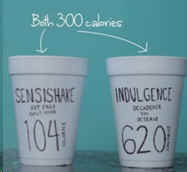Mind over milkshakes: your belief about the food, not just the food, determines your hunger response
Spiritual teachers have long repeated that the mind governs the body, a concept that is deeply unsettling to the modern popular and scientific mindset. Placebo research has long reiterated the power of the mind to control pain as well as morphine, or, calm anxiety better than Valium. Placeboes have been shown in endless medical studies to produce a 35-45 percent improvement in whatever medical condition is being treated. Now a new study has shown that our beliefs about the foods we are eating impact our appetite controlling hormones more than the nutrient content of the food.
Dr. Alia Crum, a clinical psychologist at Yale University has studied the placebo effect for years and wanted to see if the placebo effect worked on food like it does on drugs. She created an experiment with two “different” milkshakes for test subjects to drink. One was labeled as a healthy, diet drink with only 140 calories and the second was labeled as an indulgent, sugar and fat laden, drink with 620 calories.
In reality, both drinks were identical and contained 380 calories. The 46 subjects in the study read the graphic and pictorial labels and created beliefs in their minds about the food, just like you and I do when we buy food from the grocery store or restaurant. Half of the subjects got the “healthy diet” drink while the other half got the “sweet indulgent” shake.
Dr Crum the measured the hunger controlling hormone ghrelin in blood samples at 3 time points: baseline (20 min), anticipatory (60 min), and post consumption (90 min). Ghrelin is a hormone secreted by cells in the stomach response to hunger. When ghrelin levels rise, it tells us that it’s time to eat and lowers metabolism just in case we have to wait a while before mealtime. After eating, blood ghrelin levels fall telling us that we are full and do not need to eat any more. Researchers have found that a full, satisfying meal causes ghrelin levels to fall more significantly, thereby increasing metabolism to digest the bigger meal.
In the study, Dr. Crum discovered ghrelin levels (and thusly metabolism) were directly related to what the participants thought they were eating. When they had the supposedly indulgent milkshake, ghrelin levels plummeted, and when they consumed what they thought was a lighter treat, the ghrelin response was far less dramatic.
In the past, scientists believed ghrelin response was related to the nutrients reaching the digestive system. But Crum’s research suggests that’s far from the entire story — that what we think about our food has a significant impact.
“Our beliefs matter in virtually every domain, in everything we do,” Crum said. “How much is a mystery, but I don’t think we’ve given enough credit to the role of our beliefs in determining our physiology, our reality.”
You can read the published study:
Crum, A. J., Corbin, W. R., Brownell, K. D., & Salovey, P. (2011, May 16). Mind Over Milkshakes: Mindsets, Not Just Nutrients, Determine Ghrelin Response. Health Psychology. Advance online publication.





